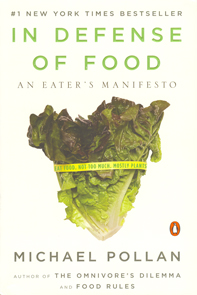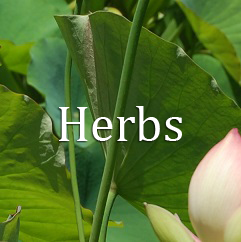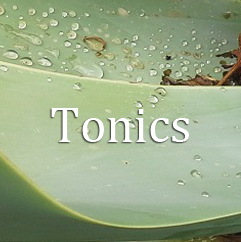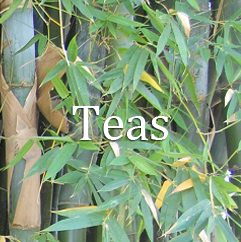
In Defense of Food: An Eater’s Manifesto. / Michael Pollan, Penguin Books, 2008.
In Defense of Food: An Eater’s Manifesto by Michael Pollan, follows two of his books on eating: The Omnivore’s Dilemma, and Food Rules, by which he’s examined the mainstream food consciousness, our relationship with what we eat in the context of our times and culture. In spite of the fact that his remarks are drawn from sociological and psychological themes, his musings are presented simply, amplifying the larger problem before us: who knew that our wonderful “Western diet” represents so many “unhealthy” eating practices?
The book is composed of three parts, thus through them we can see a pattern emerging: as food reflects cultural tastes and habits, how is it that Western culture is so glued to the science of food, rather than to a purely sensory experience of it? Part 1 is The Age of Nutritionism; Part 2, The Western Diet and the Diseases of Civilization; and Part 3, Getting Over Nutritionism. After Part 3, there are Acknowledgements, Sources, Resources and Index.
Pollan grieves that we have lost our sensibility when it comes to food choices. Since the late 1950s, writings on the subject of what we eat have delivered strong messages, but none has given such witness to the very reasons our diet and our health are in their present state. None have dealt with our loss of culture. Questions arise, such as is it healthy? will I live longer? if I eat it will I become stronger, enough to combat chronic disease, become smarter, or some other sought-after replacement of the typical supermarket offerings? These matters are characteristic of a society helpless when it comes to eating. We no longer (for a good while now) listen to our mothers and grandmothers, who know just what it is we need to eat. Instead we have allowed the reign of big business to provide for our basic needs; its greed has caused us to doubt our inherited wisdom and interfered with our pleasure of eating whole foods.
Our taste buds were initiated and refined on the pleasure principle, weren’t they? Ever since the beginning, way back when humans hunted and gathered, we tended to eat more when a plant food tasted good to us. Cultures in existence today are proud of their foods’ history. By sensation and reaction, they discovered the right food to eat when the climate’s too hot, or too cold, for day to day comfort, for medicine, for vitality, celebration of life events, large gatherings of people and many other excuses to prepare and serve something delicious to eat. And the plant food available in each culture is the basis of healthy eating, described by Pollan as traditional diets, and as a result, healthy lives. It’s only when eating a Western diet that humans are found to have terminal diseases that seem to come from their food. While we may no longer be like early humans, we do possess the same tools of discernment about what tastes good and what is good for us, we’ve just forgotten how. So what made us deviate from a purely experience-based response to food and pursue advice from experts or scientists on which artifacts to eat for best results?
Pollan’s thesis doesn’t come only from opinion. He cites numerous studies, government regulations, and 20th century literature from which developed sanctified efforts to feed a nation. Then he makes strong accusations against the food industry, nutrition science, and all of us, since we listen to experts and then eat mainly packaged, labeled food products we believe are better for us. Pollan invites us to view his survey on our eating habits and where they come from. He observes and comments on the 20th century gustatory trajectory, from real food, food your grandmother would recognize, to the nutrients we commonly take today.
Brazenly labeled a food product, that artifact in your fridge has not yet become acceptable by your body, isn’t recognized as a source of food, or in this case, nutrients. By constantly forcing the body to utilize manufactured sources of nutrition, we are making it much more difficult to be healthy. Isn’t that reason enough to change your eating habits back to real food?
Okay, our typical response would be—How is this done, what’s the science behind it, and is it going to be easy? In the third section of In Defense of Food: An Eater’s Manifesto, author Pollan takes us into his confidence, sort of like our grandmother would have, and identifies what real food there is for us to eat. He tells us not to get “dragged under… by reductionist science” by purchasing food products and specified nutrients in place of real food. His suggestions come from common sense but with a twist, such as “Shop the peripheries of the supermarket and stay out of the middle”, and “Avoid food products that make health claims”, and “Get out of the supermarket whenever possible”! He quotes author Wendell Berry, justifying that “we are not just passive consumers… but cocreators of the systems that feed us.”
The truth is “co-creators of the systems that feed us” is an empowering line. Think about it in terms of the positive opportunities there. And witness how merchandizing schemes of the day make this axiom true, especially in a market-based society such as ours. If you’re okay with a national state of ill-health, excessive food-product-eating habits and lack of wholesome foods in the national diet, then don’t bother to read this book. Not yet. Not until certain truths begin to bother you about how big business rather than concern for our welfare has created the need for a system that is killing us. In Defense of Food is an engaging treatise and should be on your required reading list, if not for Pollan’s advice, at least for his arguments against our current beliefs and reliance on science alone. Being an aspiring vegan, I was especially heartened by his admonition: “Eat food, not too much, mostly plants”. Of course, Pollan is not advocating a vegetarian lifestyle. He’s simply advising us to choose whole vegetables and fruits and integrate them into our diets. Even omnivores would likely take stock of his message: that we have lost sight of what it means to eat mainly real food.
Follow


